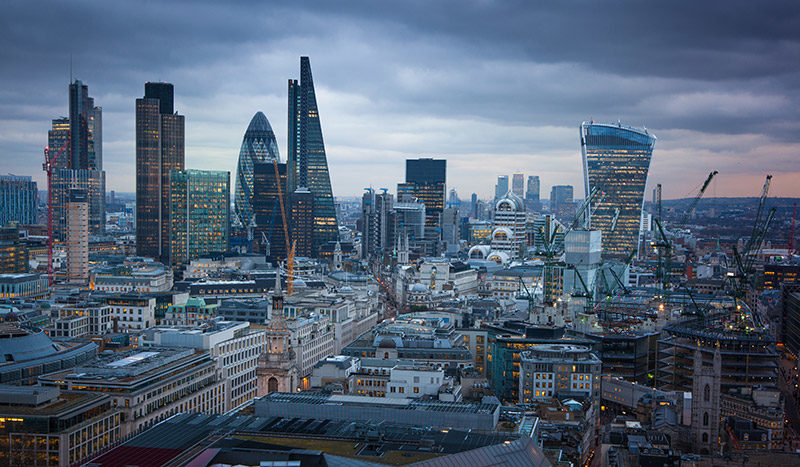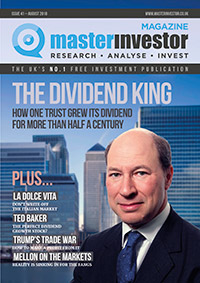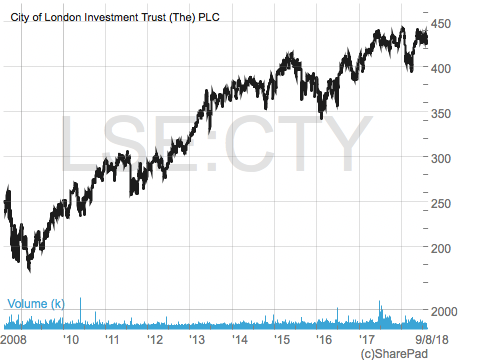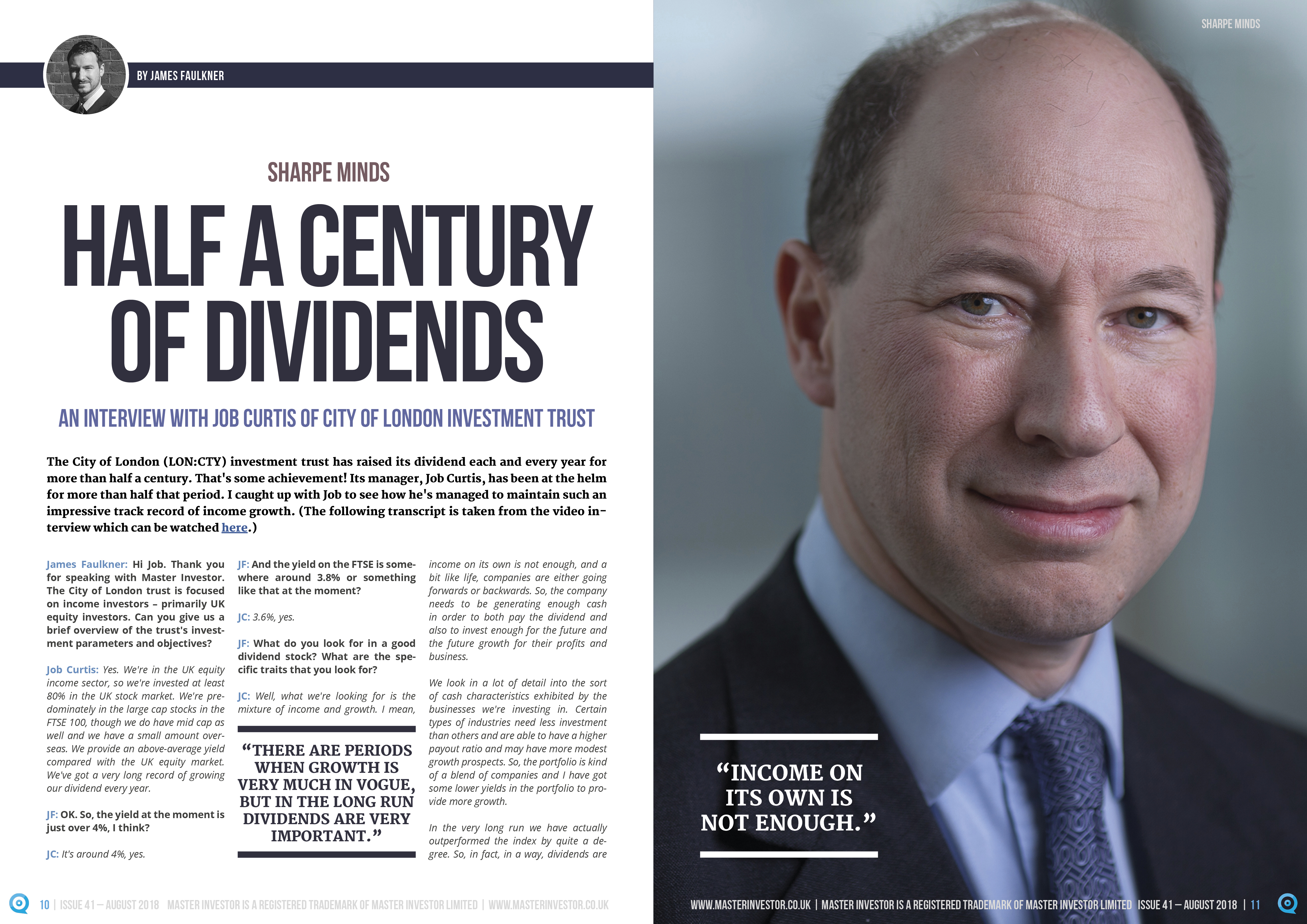Half a century of rising dividends – MAGAZINE EXCLUSIVEMAGAZINE EXCLUSIVE

MAGAZINE ARTICLE
This article first appeared in Issue 41 of Master Investor Magazine.
Click here to download the article as a printer-friendly PDF

Get this article and many more – for free! |
An interview with Job Curtis of City of London Investment Trust
The City of London (LON:CTY) investment trust has raised its dividend each and every year for more than half a century. That’s some achievement! Its manager, Job Curtis, has been at the helm for more than half that period. I caught up with Job to see how he’s managed to maintain such an impressive track record of income growth. (The following transcript is taken from the video interview which can be watched here.)
James Faulkner: Hi Job. Thank you for speaking with Master Investor. The City of London trust is focused on income investors – primarily UK equity investors. Can you give us a brief overview of the trust’s investment parameters and objectives?
Job Curtis: Yes. We’re in the UK equity income sector, so we’re invested at least 80% in the UK stock market. We’re predominately in the large cap stocks in the FTSE 100, though we do have mid cap as well and we have a small amount overseas. We provide an above-average yield compared with the UK equity market. We’ve got a very long record of growing our dividend every year.
JF: OK. So, the yield at the moment is just over 4%, I think?
JC: It’s around 4%, yes.
JF: And the yield on the FTSE is somewhere around 3.8% or something like that at the moment?
JC: 3.6%, yes.
JF: What do you look for in a good dividend stock? What are the specific traits that you look for?
JC: Well, what we’re looking for is the mixture of income and growth. I mean, income on its own is not enough, and a bit like life, companies are either going forwards or backwards. So, the company needs to be generating enough cash in order to both pay the dividend and also to invest enough for the future and the future growth for their profits and business.
We look into a lot of detail into the sort of cash characteristics exhibited by the businesses we’re investing in. Certain types of industries need less investment than others and are able to have a higher payout ratio and may have more modest growth prospects. So, the portfolio is kind of a blend of companies and I have got some lower yields in the portfolio to provide more growth.
In the very long run we have actually outperformed the index by quite a degree. So, in fact, in a way, dividends are the secret part of investing and actually a lot of the long-term returns come from income. There are periods when growth is very much in vogue, but in the long run dividends are very important.
JF: And going forward, with rates being so low I suppose the dividend income is going to be a greater component of returns?
JC: Well, rates have been very low for a while as we know. They were cut down to 0.5% towards the end of the financial crisis in 2009, and have stayed very low ever since. So, in actual fact, it means that an equity income trust such as ourselves is popular because it’s very hard to find that type of yield that we’re providing, around 4% – you can’t find it in bank deposit accounts – and we’re providing income growth as well.
But, but having said that, it’s actually been a good period for growth stock investing in recent years. The world markets have really been led by the so-called FAANG stocks in America, the Facebooks, Apples, Alphabets etc. So, I wouldn’t say that this is necessarily purely a good era for income investing; it’s been a good era overall for stock markets.
JF: And the trust itself has got a really impressive record of dividend growth. I think it’s 52 years of annual increases in dividend payment now?
JC: Yes.
JF: And you yourself have been there for around 27 years?
JC: Yes, just passed my 27th, yes.
JF: So, what’s your secret to dividend success?
JC: Well, I think you’ve got to be in the right companies – the companies that have provided and are well placed to provide consistent dividend growth. And that obviously requires work and analysis and judgment.
But the investment structure does have certain advantages, and unlike open-ended funds we don’t have to fully distribute all our income every year, so we can hold back up to 15%. So that means you build up a revenue reserve and then in the years when there are dividend cuts across the market then you can use that reserve to carry on growing the dividend. So, actually, out of the 27 years I’ve been manager, seven years we’ve had to dig into reserves, so I couldn’t have achieved that record and the trust wouldn’t have achieved that record if we’d been open-ended. It just wouldn’t have been possible.

JF: And there’s a lot of debate surrounding the OEIC versus the trust structure. What else is it about the investment trust structure that enables that superior performance, do you think, over the long-term?
JC: Well, I think it’s horses for courses and, you know, some people will prefer open-ended.
But certainly, one aspect that investment trusts can utilise is gearing (i.e. borrowing), but this is not to everyone’s taste. We do it in a conservative way, but certainly in a rising market that will enhance returns.
And then investment trusts also have independent boards of directors who provide an extra level of scrutiny and they’re also there to act in shareholders’ interests, so they’re there to negotiate fees, for example. Some investment trusts have higher fees than OEICs, but in general trusts have lower fees, and our ongoing charges are particularly low – 0.42% last year, which is much lower than you’d find in an equivalent OEIC.
JF: What about Brexit? Obviously, the situation at the moment is utterly confusing, nobody really knows what’s going on. How is that impacting investors such as yourself at the moment?
JC: Well, I think it is a very difficult situation to read and it changes quite a lot. But I think the important thing to remember is you’re investing in companies, and on the UK stock market over 70% of the profits come from overseas, so that gives you a sort of insulation really from looking primarily from a UK perspective.
But, to some extent the UK’s being shunned both by domestic investors and global investors. And so, if you take a relatively sanguine view, that may be throwing up quite a lot of value actually in some of the domestic sectors. So, I think it would be a mistake to ignore some of the domestic sectors, particularly if we get a favourable outcome, as there could be a lot of opportunity there.
At City of London we’re mainly in the large international companies but we do have our fair share of domestic companies, like house builders where I’m also quite keen on prospects.
JF: And while we’re on the subject of value, a lot of people have been looking at the US markets in particular and thinking they look quite toppy at the moment. The UK market looks quite a lot cheaper. What’s your view on valuations from long-term perspective at the moment?
JC: Well, I think the UK market does look good value relative to the trailing measures we look at like dividend yields or P/E ratios. Some people try to do it on cyclically adjusted basis, but again it doesn’t look bad value compared to some of the other markets. The US has got this big technology sector which has really caught the imagination of people, and certainly, the companies there are doing remarkable things, but they have very high valuations. But because they are growing their revenues so rapidly, people are willing to put them on a very high valuation.
We don’t really have a big technology sector in the UK, so it’s not completely comparing apples with apples, but the market certainly looks good value relative to fixed interest. The yield on the market is 3.6% and you’ve got mid-single digit dividend growth. Ten-year gilts, meanwhile, are yielding about 1.3%.
I think the UK market does look reasonable value at the moment, but we’ve had a long bull market – markets have been going up for the best part of nine years – and so obviously people do get a bit anxious. But, certainly, on the measures I look at, companies seem in good shape and so I’m pretty happy with it myself.
JF: Which sectors in particular and which companies in particular are you finding value in at the moment? What are you buying and selling?
JC: Well, I was going to suggest an idea which works quite well as a pair, as you might put it. I quite like the oil sector at the moment, I mean Shell and BP. Both are very big companies…
JF: Both have had quite a good run.
JC: …They’ve had a good run, but people were worrying a year or so ago whether they’d have to cut their dividends and now they’re actually covering their dividends with free cash, as they’ve reduced their costs dramatically. And, of course, the oil price has moved up quite sharply over the last year and global growth has boosted demand for oil and supply has been constrained, particularly when you throw in renewed sanctions on Iran.
So, the oil majors are in a good place and they’re both yielding over 5% at the moment. These are very big companies and they’re not going to perform like a small cap stock might, but I think they look pretty solid at the moment.
And then, the one I wanted to connect with them or combine with them was actually Carnival, which is the biggest cruise company in the world. It’s a dual-listed stock 80% listed in the US and 20% listed in the UK.
Cruising is actually quite a good growth area. It’s a relatively good value holiday compared with the equivalents on land and it appeals to some of the older parts of the population and benefits from the good demographics, but Carnival quite cleverly have lots of different brands within their companies – so, they have got brands that appeal to the younger generation as well.
I think the shares haven’t performed at all well over the last year or so and that’s because obviously fuel is a big component of costs for the ships and so the market tends to mark them down when the oil price is going up. They’re producing some steady growth, but I think it is the sort of stock where if I’m actually wrong and the oil price does have a setback, then Carnival will certainly be…
JF: It’s a hedge.
JC: Exactly. So, it’d be a good combination to have either Shell or BP and Carnival as a combination, I think.
JF: OK. And what about the interest rate environment? Because a lot of people see interest rates rising in the near term. How does that impact you as an income investor? Are you worried about that?
JC: Well, I think you have to take a step back. Obviously, they were cut from 0.5% down to 0.25% after the referendum and then that’s been reversed so we’re back at 0.5%. And the
Bank of England sort of blows hot and cold a bit, but it looks as though we might be in for another 25 basis-point hike, so they go to 0.75%. Well, that is still nothing compared to what you’re getting in the stock market at 3.6% or City of London at 4%.
Given how the Bank of England are agonising about whether they’ll increase it from 0.5% to 0.75%, I think the kind of interest rates that I was used to when I was growing up seem a long way away. And there’s certainly arguments out there that there’s so much more debt around and also deflationary forces like Amazon and internet retail generally, not to mention general capacity in manufactured goods, but we are in a much lower interest rate environment than we have been in the past.
JF: So you think the natural long-term interest rate could actually now be lower than it has been in the past?
JC: Oh, I think that’s what all the indications are. I mean you wouldn’t have 30-year gilt
yields at 1.72% or whatever they are today if that was not definitely the belief in markets. But, certainly, it’s a slightly different picture in America where the Federal Reserve has been increasing their interest rates more rapidly and 10-year yields are much higher than they are in the UK.
I think the interest rates we’ve now got in the UK are abnormally low and I think what the US is doing is good, I think they’re kind of normalising interest rates. But I think we are in a much lower inflation era than we were back in the 1970s or ‘80s, so I think you would expect interest rates to be lower than they were then, but I would expect to see them markedly higher than they are now over the next few years.
JF: OK. Job Curtis, thanks very much.
JC: Thank you.
About Job Curtis
Job Curtis is Director of Global Equity Income at Janus Henderson Investors, a position he has held since 2006. He has been Portfolio Manager of the City of London Investment Trust since 1991, and is also co-manager of the Global Equity Income and Global Dividend & Income strategies. Job joined Henderson in 1992 following Henderson’s acquisition of Touche Remnant, where he had served as a unit trust and investment trust manager since 1987. Prior to this, he was an assistant fund manager at Cornhill Insurance from 1985 to 1987, and a graduate trainee at Grieveson Grant stockbrokers from 1983 to 1985. Job holds a MA in philosophy, politics, and economics from Oxford University and is an associate member of the Society of Investment Professionals. He has 35 years of financial industry experience.

|
Comments (0)